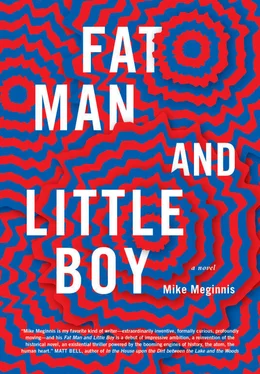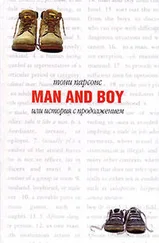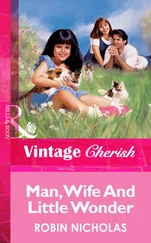He takes his bicycle from the utility cabin. There is a light fog on the air. His skin beads with moisture as he pedals through it. He rolls over mud and grass and pavement, past white busts of the marshal and shops not yet opened. Church bells sound. The sun’s coming.
He jumps off the bike at a bakery. The bike clatters to its side, scraping his calf on its way to the street. He stands it back up and lowers the kickstand. The bakery’s just opened. When he opens the door a burst of warm air, smell of flour and of jam, cheerful ring of eager little bell, a glass display, a man kneading dough at the counter. The display is piled with braided breads, flaky crescent rolls, split-top loaves, and pastries.
The bell rings a second time as the door closes and cold air dissipates. The baker sees Little Boy. He has a big neatly combed mustache and big red-ringed watery eyes that swim and shimmer. “Hello,” says the baker, in French. “I don’t think I know you, little boy.”
Little Boy tilts his head and shows his teeth. He points at the display.
“Hello? What is your name?” The baker reaches out his floury hand. “I am Mr. Girard. A pleasure to meet you.”
“Hello,” says Little Boy, ignoring the hand. He points at the display. He understands the baker reasonably well, though mostly from context.
“Do you want something to eat?”
Little Boy nods. He points at the display again, and then at his mouth. He smiles.
“Which ones do you want?”
Little Boy indicates a raspberry pastry and one filled with sweet cheese. The baker takes them from behind the glass and wraps them in wax paper. As he thumbs the creases creased, he tells the little boy how much they cost. Little Boy pretends incomprehension, trying to pass off paying half the price as a misunderstanding. The baker insists, counting out coins from his own pocket to show how it’s done. Little Boy relents and follows his example. He glances out the window.
There is a girl passing by with strong, lean calves peeking out beneath her skirt. Her ankles are pretty knots of muscle and bone. Her dark hair bobs in the breeze.
Little Boy smiles for the baker, takes his pastries in their brown paper bag, and begins to leave.
“Wait,” says the baker. “Are you mute or something? Where are you from?”
The question floats to the ceiling and settles there. Little Boy opens the door. The bell cheerfully retorts, and a second time behind him. The girl has already walked a fair distance. She is brisk and graceful, though she does not bother with the feminine niceties of the schoolgirl’s walk. Her ragged, yellow school books are not held primly underneath her chin in folded hands, but slung from her shoulder by one limp, swinging arm. Little Boy stuffs the pastry bag in his coat’s breast pocket and, running, mounts his bike. He flails to raise the kickstand with his heel. How old is she? He tries to count the years in her clothing, in the snappy rise and fall of her buttocks. He is pedaling toward her, wheels flecking mud on the pavement. He doesn’t know what to say. The only French that comes to mind is an apology. He wants to know how to say goodbye as well. He wants to know how to say, Are you finished with that? These are all the wrong words.
She hears the bike coming. Pauses, mid-step, twisting on the toes of one foot and the heel of the other. He reaches into his coat for the pastries, fumbling to offer her one. She begins to greet him and then they are too close, and then his bike speckles her hem with dirt. Her eyes, and the roses in her cheeks, and the faint worry lines already framing her mouth. She is, he thinks, thirteen. Just like him.
He passes her. Other children filter into the street, converging on one habitual procession. They all have the same school books, in various jackets and states of repair. He whips the bike into a hard turn, loops back, stippling the other side of her dress as well, and shouts his name: “John!”
Wait, that’s not right.
He whips back again. He calls out, “Matthew!”
A fist meets his gut. He lets go the handlebars as if someone asked him to do it. His feet slip from the pedals. The back of his head meets the pavement, and the bike falls, and he swallows back stomach acids. A circular peach shadow descends on him, becomes an oval, becomes a head and shoulders. He focuses his eyes. A harelipped boy in cap and red blazer grimaces down at him, hiding all the teeth that he can hide. An ivory sliver and puffy red gums peek through his upper lip’s division.
“Who are you?” he asks, leaning in to study Little Boy. “Why don’t you leave her alone, Yankee Doodle?”
Other children gather around them laughing—smaller boys and girls, teenage youths. One of them is standing up his bike, no doubt to steal it. Little Boy scrambles to his feet, kicking the harelipped boy in the shoulder on his way. Walking feels like swimming. He makes for his bike, picking up the pastry bag as he wades. He wrenches his bike free. There, several dozen feet away, is the dark-haired girl with his mud on her skirt. She walks as if nothing has happened. Little Boy climbs up on the bike. He considers running her down. The harelipped boy, however, tugs on his jacket. He holds the bike in place with his left hand, by its back wheel. He coolly motions over his shoulder as if to say, Go back the way you came.
Little Boy spits on him and rides away bawling.
When he comes back to Hotel Gurs, Little Boy has eaten both his pastries. Raspberry and sweet cheese residues scab around the corners of his mouth. There is a harelipped boy set aflame in his heart, a weirdly handsome monster with tusks and massive fists. There is a harelipped boy, blond like him, but better: butter gold to Little Boy’s corn-silk white, forever pushing him from his bike. Making him dirty his clothes. There is a harelipped boy with a sharp little chin and cheekbones like the split tops of the baker’s bread. There is a harelipped boy, brutal and genuinely French—a harelipped boy who can see he is American just by looking, which isn’t even fair because he’s never even been to America, not really. There is a harelipped boy who would keep him from a dark-haired girl he only just met, whom he has never hurt.
He puts away his bicycle in the utility cabin.
Collapses sobbing against the blue brick wall. The sound becomes inarticulate, awful, like a baby bird begging, but lower, wetter. Fat Man follows it to him. He looms stupidly—another oval, another head-and-shoulders shadow. There is a harelipped boy.
“What’s got you in a fit so early?”
Little Boy sticks out his tongue.
“Did you fall down somewhere?”
Little Boy shakes his head.
“What’s that sugar doing on your mouth?”
Little Boy wipes his mouth.
“A pastry,” says his brother, sniffing the little boy’s breath. “ Two pastries!”
The bawling continues.
“With whose money did you buy them? That was our money. You didn’t even get me one. That’s really unfair, Matthew.”
Little Boy croaks, “Carry me?”
His brother raises his hand to slap him. Little Boy quiets himself, wipes the snot from underneath his nose, and ignores the tears still flowing down over his cheeks and ears.
“Please, brother. Carry me home?”
Fat Man sighs, hoisting his little brother. “All I’m saying is next time you have to share with me.”
Fat Man is watering the milk when their first guest comes to stay. Fat Man pours half the big glass jug into an empty. White threads split down the sides, weaving pooling liquid at the bottom. He pours a pail of water down its mouth and watches the milk multiply. He lowers the pail into the well and draws it back up; fills the other jug. It gleams a bluish white in the failing light, smooth and sweet as pearls.
Читать дальше












